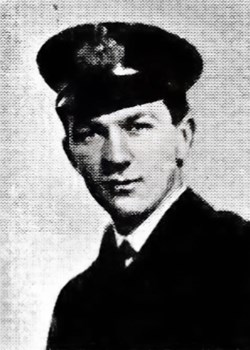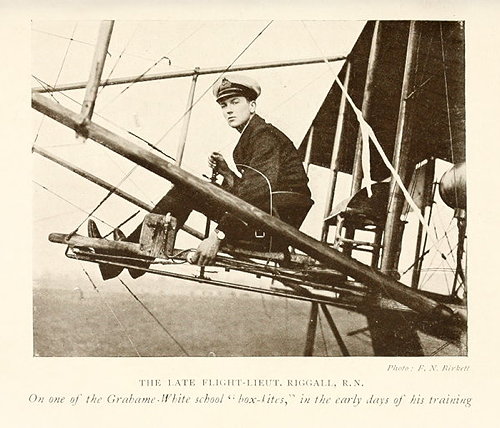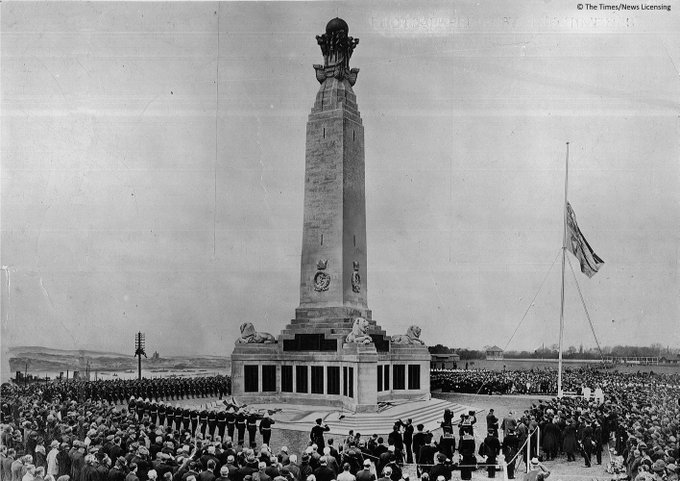Edward Gordon Riggall was killed in action on this day in 1915

Edward Gordon Riggall was born on 21 August 1895 in Grimsby, England, the son of Frederick Riggall JP, a former Mayor of Grimsby. He was educated at Humberstone Foundation School in Old Clee from 1904 to 1912, where he excelled academically, serving as the school's captain and passing the senior Cambridge Examination with honours.
Riggall pursued a career in aviation, becoming an apprentice aeronautical engineer and manufacturer. He earned his Royal Aero Club pilot’s certificate (no. 939) on 11 October 1914 at Hendon, flying a Grahame-White biplane.

Following the outbreak of the First World War, Riggall was commissioned as a sub-lieutenant in the Royal Naval Air Service on 18 August 1914. He was promoted to lieutenant on 1 January 1915 and joined No. 1 Squadron, RNAS.
Raids in response to Germany’s submarine blockade
In early 1915, Britain faced the threat of Germany’s declaration of a submarine blockade of the British Isles. In response, aircraft were concentrated at Dover and Dunkirk for operations targeting German submarine bases and military installations along the Belgian coast.
On 12 February 1915, Riggall piloted an Avro 504 biplane from Dover to Calais, participating in a mission to bomb German submarine facilities and a power house.
On 16 February 1915, during a major aerial raid over the Ostend district, Riggall, failed to return. The Times later reported: “Exhaustive enquiries have satisfied the authorities that he was shot down and killed while returning from this exploit. Edward was 19 years old.”
Admiralty’s official reports on the raids
The following is the Admiralty’s official account of the raids over Belgium:
“During the last twenty-four hours, combined aeroplane and seaplane operations have been carried out by the Naval Wing in the Bruges, Zeebrugge, Blankenberghe and Ostend districts, with a view to preventing the development of submarine bases and establishments.
Thirty-four naval aeroplanes and seaplanes took part.
Great damage is reported to have been done to Ostend Railway Station, which, according to present information, has probably been burnt to the ground. The railway station at Blankenberghe was damaged and railway lines were torn up in many places. Bombs were dropped on gun positions at Middelkerke, also on the power station and German mine-sweeping vessels at Zeebrugge, but the damage done is unknown.
During the attack the machines encountered heavy banks of snow.
No submarines were seen.
Flight Commander Grahame-White fell into the sea off Nieuport and was rescued by a French vessel.
Although exposed to heavy gunfire from rifles, anti-aircraft guns, mitrailleuses, etc., all pilots are safe. Two machines were damaged.
The seaplanes and aeroplanes were under the command of Wing Commander Samson, assisted by Wing Commander Longmore and Squadron Commanders Porte, Courtney, and Rathbone".
The following is the Admiralty’s official account of the raid on 16 February 1915, during which Riggall was killed:
“The air operations of the Naval Wing against the Bruges, Ostend-Zeebrugge District have been continued.
This afternoon 40 aeroplanes and seaplanes bombarded Ostend, Middelkerke, Ghistelles, and Zeebrugge.
Bombs were dropped on the heavy batteries situated on the east and west sides of Ostend harbour; on the gun positions at Middelkerke; on transport wagons on the Ostend-Ghistelles road; on the mole at Zeebrugge to widen the breach damaged in former attacks; on the locks at Zeebrugge; on barges outside Blankenberghe, and on trawlers outside Zeebrugge.
Eight French aeroplanes assisted the naval machines by making a vigorous attack on the Ghistelles aerodrome, thus effectively preventing the German aircraft from cutting off our machines.
It is reported that good results were obtained.
Instructions are always issued to confine the attacks to points of military importance, and every effort is made by the flying officers to "avoid dropping bombs on any residential portions of the towns".
Edward Gordon Riggall is commemorated on the Chatham Naval Memorial and named in the Grimsby Roll of Honour, 1914–1919

Flight Lieutenant Edward Gordon Riggall, Royal Naval Air Service
